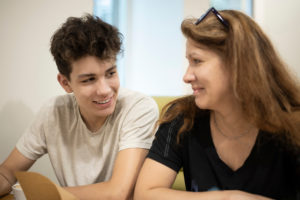Share this article.
There is an old adage that it takes a village to raise a child. We believe that a child needs a supportive community to own their learning. When we own something, it’s ours. It belongs to us. No one else can ever take it away. Isn’t that what we want our children to feel about their learning?
Yes, it is.
And you, parent and caregiver, are a crucial part of that supportive community. Without you and your influence regarding the importance of academic achievement, a student’s role becomes difficult. With you and your influence, your child’s role becomes easier because they are part of a team. This means you, as a parent and caregiver, have a key role in developing your child’s learning at home. And, research supports this:
“Overall, ‘the higher the hopes and expectations of parents with respect to the educational attainment of their child, the higher the student’s own educational expectations and, ultimately, the greater the student’s academic achievement.’ (Hong & Ho, 2005, p. 40) These high expectations are assisted by greater parent-student communication and the student’s control over their own studies.” – Hattie, 2009
We all know that we live in a world that is changing at a faster rate than ever before. Success in the future is not about what we know, but rather, what we can do with what we know. This means that your child needs the ability to identify:
- What skills they need to learn in order to do their job more effectively and efficiently,
- What these skills look like at the highest level,
- What their methods are for learning these skills,
- How to recognize if they are learning or if they are struggling,
- How to ask for help—and respond to the feedback with a growth mindset,
- What their specific learning needs are and how to get extra support, and
- How they support others in the same situation.
 What we have just described is ownership. Someone who has true ownership of their learning is one who self-directs, self-evaluates, self-reflects, and self-controls their own learning. This is exactly what colleges and employers are looking for.
What we have just described is ownership. Someone who has true ownership of their learning is one who self-directs, self-evaluates, self-reflects, and self-controls their own learning. This is exactly what colleges and employers are looking for.
But this isn’t easy to achieve. It will take a community to support your child to own their learning. And, as we have said, you are an important part of this community.
So, what is your role?
Well, first off, let’s tell you what it is NOT. Your role is not to be the teacher. So, you do not have to stress if you aren’t an expert in algebra, ancient history, or scientific theory. Your child has teachers who are experts in those areas. Trust that they know what they are doing.
So then, what is your role?
- Your role is to get your child thinking and talking about their learning.
- Your role is to foster metacognition.
- Your role is to build your child’s academic mindset.
 From the youngest children to the oldest adults, we can all learn to have a new mindset. Just like any other thoughts, beliefs, and attitudes, a person’s mindset can be taught, reinforced, and learned.
From the youngest children to the oldest adults, we can all learn to have a new mindset. Just like any other thoughts, beliefs, and attitudes, a person’s mindset can be taught, reinforced, and learned.
- Your role in your child’s academic life is to motivate them to clearly know what they are learning, how they are learning it, and how well they are learning it.
- Your role is to develop their understanding of their role as a learner, a life-long learner.
- Your role is to support them to take ownership of their own learning.
And, we are here to help you.
We have resources to support you and your child when learning at home. Check them out.
Continue the Learning
Check out these articles and resources to continue your learning about this topic…
The Learning Brief
In this article you learned…
- That for students to be successful they need to have ownership of their learning. In other words, they must be able to self-direct, self-evaluate, self-reflect, and self-control their own learning.
- A parent’s and caregiver’s role is not to be the teacher but to motivate their child to clearly know what they are learning, how they are learning it, and how well they are learning it. In other words, their role is to support their child in taking ownership of their learning.
- How to use specially designed resources and tools to support student ownership at home.
Can you imagine building an environment full of motivated, engaged, and eager students who own their learning?
We can.

